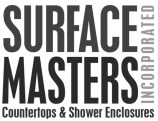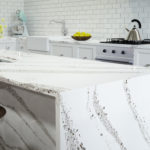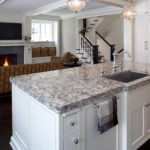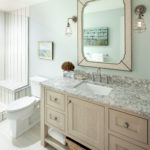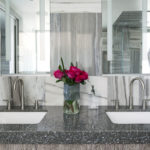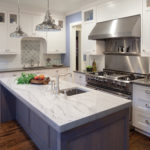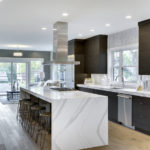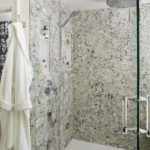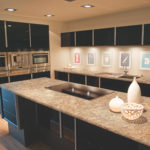Engineered quartz (not to be confused with Quartzite, another appealing natural stone used as counters) is a manmade product created mostly from natural materials. It’s made of 90 to 94 percent ground quartz and 6 to 10 percent resins and pigments that are combined into durable and nonporous slabs. The strength of quartz, even in a manufactured form, makes it naturally resistant to abrasion, scratches, dents, and even acids without the need for sealants. And the environmental impact of manufactured quartz is low: Quartz is an abundant material and the finished product is nontoxic and nonallergenic, and will last a lifetime, reducing the need for replacement.
Unlike solid-surface, Corian-type manufactured countertops, engineered quartz is not made to order. The product, like natural stone, is created in slabs of set sizes and thicknesses that vary by manufacturer. Caesarstone, for example, offers one slab size (56.5 inches by 120 inches) and two thickness options (0.75 inches and 1.25 inches). The slabs are fabricated to fit your project’s requirements (size, shape, and edge profile), and are installed in pieces.
One of the appealing features of engineered quartz is its wide variety of colors, patterns, and textures. And the range is continuously expanding, spurred on by competition between brands. Note that the color and texture of engineered quartz are more consistent than natural stone—to some this uniformity is an appealing feature and to others it’s a drawback
Silestone Quartz – www.silestoneusa.com
Pental Quartz – www.pentalquartz.com
Cambria Quartz – www.cambriausa.com
Cambria Company LLC
Zodiaq Quartz – www.dupont.com/zodiaq
LG Viatera Quartz – www.lgviaterausa.com
Vadara Quartz – www.vadaraquartz.com
ONE Quartz – www.daltile.com
Q-Quartz – https://www.msistone.com/quartz-countertops
TCE Stone – www.tcestoneusa.com
Hanstone – www.hanstone-quartz.com
Spectrum – www.spectrumquartz.com
